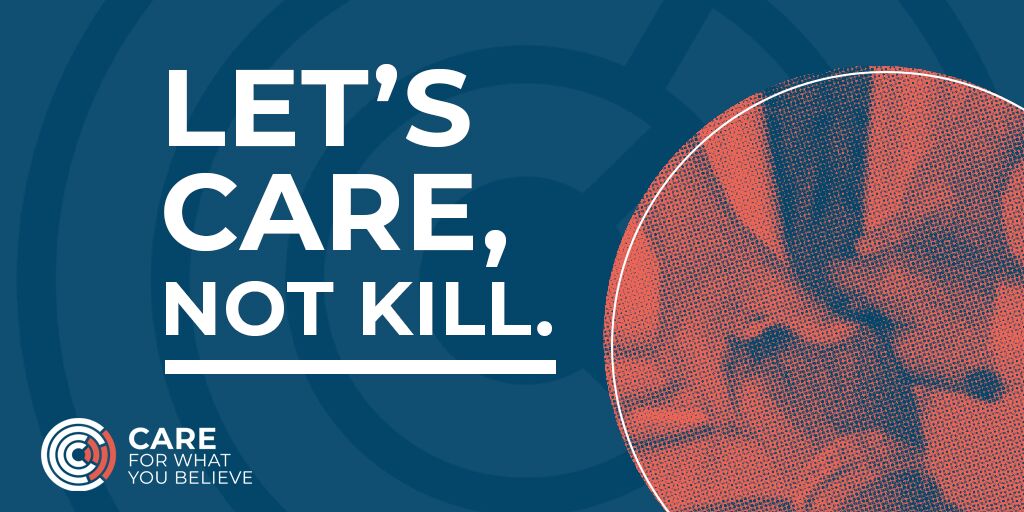Assisted suicide is where a doctor helps a patient to kill themselves by prescribing a lethal drug for the patient to take. This becomes euthanasia when the doctor administers the drug directly. There has been much debate in the UK in recent years over issues concerning the end of life. Here we briefly outline the main arguments for and against assisted suicide and euthanasia, and outline CARE's perspective on the issue. Below you will also find resources and further reading.
The Arguments For Assisted Suicide & Euthanasia
“We have no control over how we arrive in the world but at the end of life we should have control over how we leave it.”
1. We need it
This is 'the compassion argument'. Supporters of assisted suicide believe that allowing people to ‘die with dignity’ is kinder than forcing them to continue their lives with suffering.
2. We want it
This is known as 'the autonomy argument'. Some believe that every patient has a right to choose when to die.
3. We can control it
This is 'the public policy argument'. Proponents believe that assisted suicide can be safely regulated by government legislation.
The Arguments Against Assisted Suicide & Euthanasia
“The experience of death is going to get more and more painful, contrary to what many people believe. The forthcoming euthanasia will make it more rather than less painful because it will put the emphasis on personal decision in a way which was blissfully alien to the whole problem of dying in former times. It will make death even more subjectively intolerable, for people will feel responsible for their own deaths and morally obligated to rid their relatives of their unwanted presence. Euthanasia will further intensify all the problems its advocates think it will solve.”
1. Alternative treatments are available
Alternative treatments are available, such as palliative care and hospices. We do not have to kill the patient to kill the symptoms. Nearly all pain can be relieved.
2. There is no ‘right’ to be killed and the slippery slope of assisted suicide is real
Opening the doors to voluntary euthanasia and assisted suicide could lead to non-voluntary and involuntary euthanasia, by giving doctors the power to decide when a patient’s life is not worth living. In the Netherlands in 1990 around 1,000 patients were killed without their request.
3. We could never truly control it.
Reports from the Netherlands, where euthanasia and physician-assisted suicide are legal, reveal that doctors do not always report it.
4. The assumption that patients should have a right to die would impose on doctors a duty to kill
The assumption that patients should have a right to die would impose on doctors a duty to kill, thus restricting the autonomy of the doctor. Also, a ‘right to die’ for some people might well become a ‘duty to die’ by others, particularly those who are vulnerable or dependent upon others.

CARE’s Perspective: Why say no to euthanasia and assisted suicide?
What about personal choice?
The pro-euthanasia and assisted suicide lobby emphasise the importance of personal choice and autonomy. Shouldn’t patients have the right to end their lives? Dignity in Dying patron, Sir Patrick Stewart has argued “We have no control over how we arrive in the world but at the end of life we should have control over how we leave it.”
Surely however the debate is not about the right to die; it is about the right to help patients kill themselves. Instead of giving freedom to patients, euthanasia and assisted suicide is about giving other people the legal power to end another person’s life.
Assisted suicide is not a private act. Nobody chooses assisted suicide in isolation. Euthanasia and assisted suicide are matters of public concern because they involve one person facilitating the death of another. Friends, relatives, healthcare staff and society are hugely affected by the wider ramifications of the process.
Journalist and author George Pitcher has said that any change in the law would have “profound adverse affects on the social fabric of our society, on our attitudes towards each other’s deaths and illnesses, on our attitudes towards those who are ill and have disabilities.”
Increased autonomy would apply only if you met all the criteria to be eligible. If you had a disease where the prognosis is not straightforward, dementia or a chronic but not terminal disease, then you would not meet the criteria; attempts to extend the law further would be almost inevitable. Assisted suicide is not a private act and there is a real risk that a ‘right to die’ may soon become a ‘duty to die’.
What about compassion?
The pro-euthanasia and assisted suicide lobby will often present the view that helping someone else to end their life is the most loving and compassionate thing to do. But surely the most compassionate thing to do is to care for a person at the end of their life and to show them that their life has tremendous value regardless of age or abilities.
Palliative care is an area of healthcare that focuses on relieving and preventing the suffering of patients. Britain is the only country in the world where palliative care is a recognised medical specialism. Further, in a recent survey by The Economist Britain was ranked first in the world for quality end-of-life care. The survey took in 40 OECD and non-OECD countries, including the USA, the Netherlands, Germany and France.
What about the most vulnerable?
Changing the law to allow euthanasia or assisted suicide will inevitably put pressure on vulnerable people to end their lives for fear of being a financial, emotional or care burden upon others. This would especially affect people who are disabled, elderly, sick or depressed. Some would face the added risk of coercion by others who might stand to gain from their deaths. Fear and anxiety would be promoted rather than Individual autonomy.
In its 1994 report The House of Lords Select Committee on Medical Ethics concluded:
“It was virtually impossible to ensure that all acts of euthanasia were truly voluntary and that any liberalisation of the law in the United Kingdom could not be abused. We were also concerned that vulnerable people – the elderly, lonely, sick or distressed – would feel pressure, whether real or imagined, to request early death.”
The law must protect the most vulnerable people in society. We must never let the depressed, the confused, those in terrible pain, the aged and the vulnerable feel that they should pursue the path of assisted suicide so as not to be a burden on others.
Dr Andrew Fergusson, of the Care Not Killing Alliance, has said “the simple truth is that the current law exists to protect those without a voice: the disabled, terminally ill and elderly, who might otherwise feel pressured into ending their lives”.
What next?
Studies concerning the euthanasia and assisted suicide law in countries that have legalised such measures make for troubling reading.
A study conducted in 2012 shows that 32% of the assisted deaths in Belgium are carried out without request and 47% of assisted deaths go unreported in the Flanders region of Belgium. Another recent study found that nurses are regularly euthanasing their patients in Belgium even though the laws prohibits it. Since euthanasia was legalised in 2002 there has not been one attempt to prosecute for abuses of the euthanasia law. In addition to this the study shows there was a 25% increase in the number of assisted deaths in Belgium in 2012.
In Oregon (where assisted suicide was legalised in 1997) the law has led to patients ‘doctor shopping’ for willing practitioners, using doctors who have minimal knowledge of their past. In 2008, 50 per cent of patients requesting suicide were assisted to die by a doctor who had been their physician for eight weeks or less.
Not all people who are terminally ill wish to end their life.
There have been tragic cases of people suffering terminable illness who want other people to help them end their life. It is important however that we do not lose sight of the large number of people who are terminally ill and have found richness and purpose in life despite the pain and hardship.
A survey published by the British Medical Journal in 2011 found that the majority of patients who are almost completely paralysed but fully conscious have said they are happy and do not want to die. The survey questioned 168 members of the French Association for Locked-in Syndrome.
Matthew Hampson was a promising young rugby player until a collapsing scrum left him paralysed from the neck down and requiring a ventilator to breathe. Matt divides his time between raising money for spinal care for UK charity Spinal Research, coaching youngsters at local schools and writing columns for rugby magazines. He has also written an autobiography. The Matt Hampson Foundation provides help, advice and for young people seriously injured through sport.
All life has profound human value.
We have to make clear that the value of life should not be determined by its benefit to others, or what it can contribute to society. The French biologist and philosopher Jean Rostand once said: “For my part I believe that there is no life so degraded, debased, deteriorated, or impoverished that it does not deserve respect and is not worth defending with zeal and conviction.”






